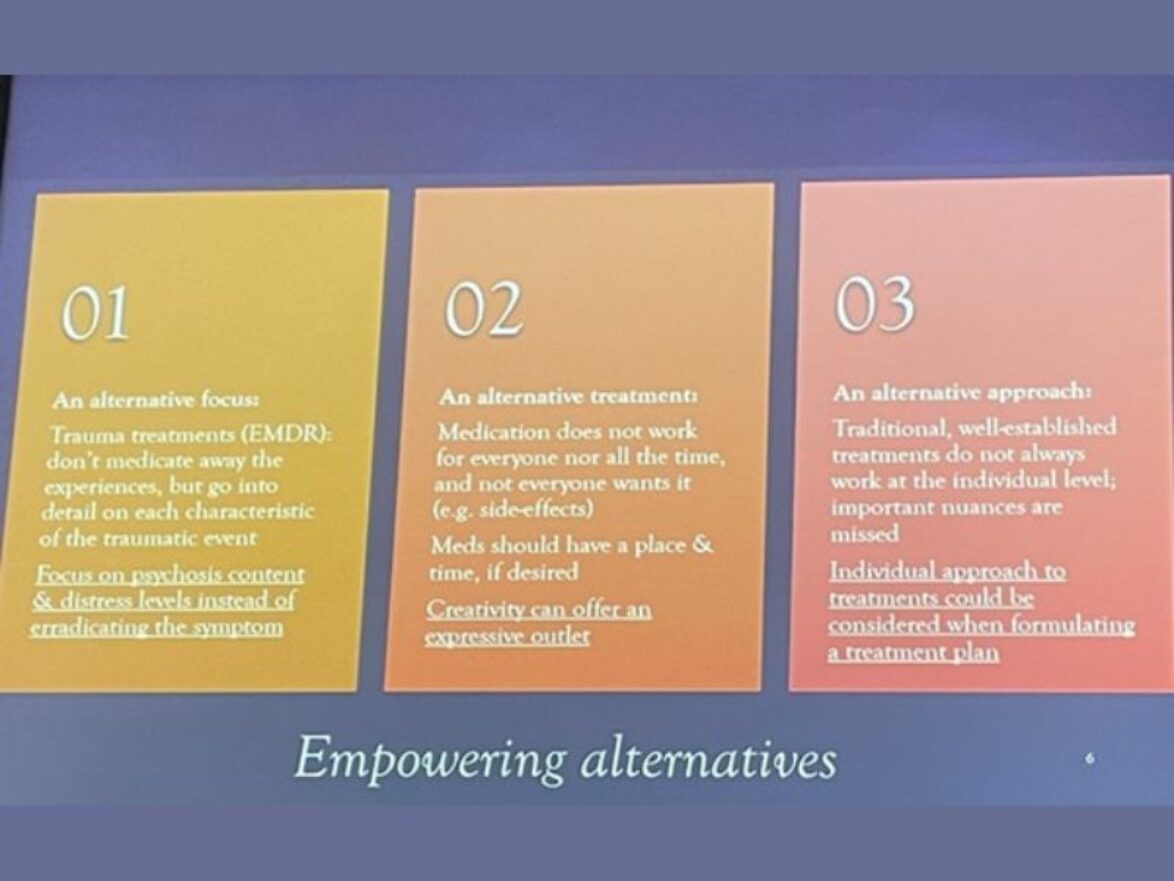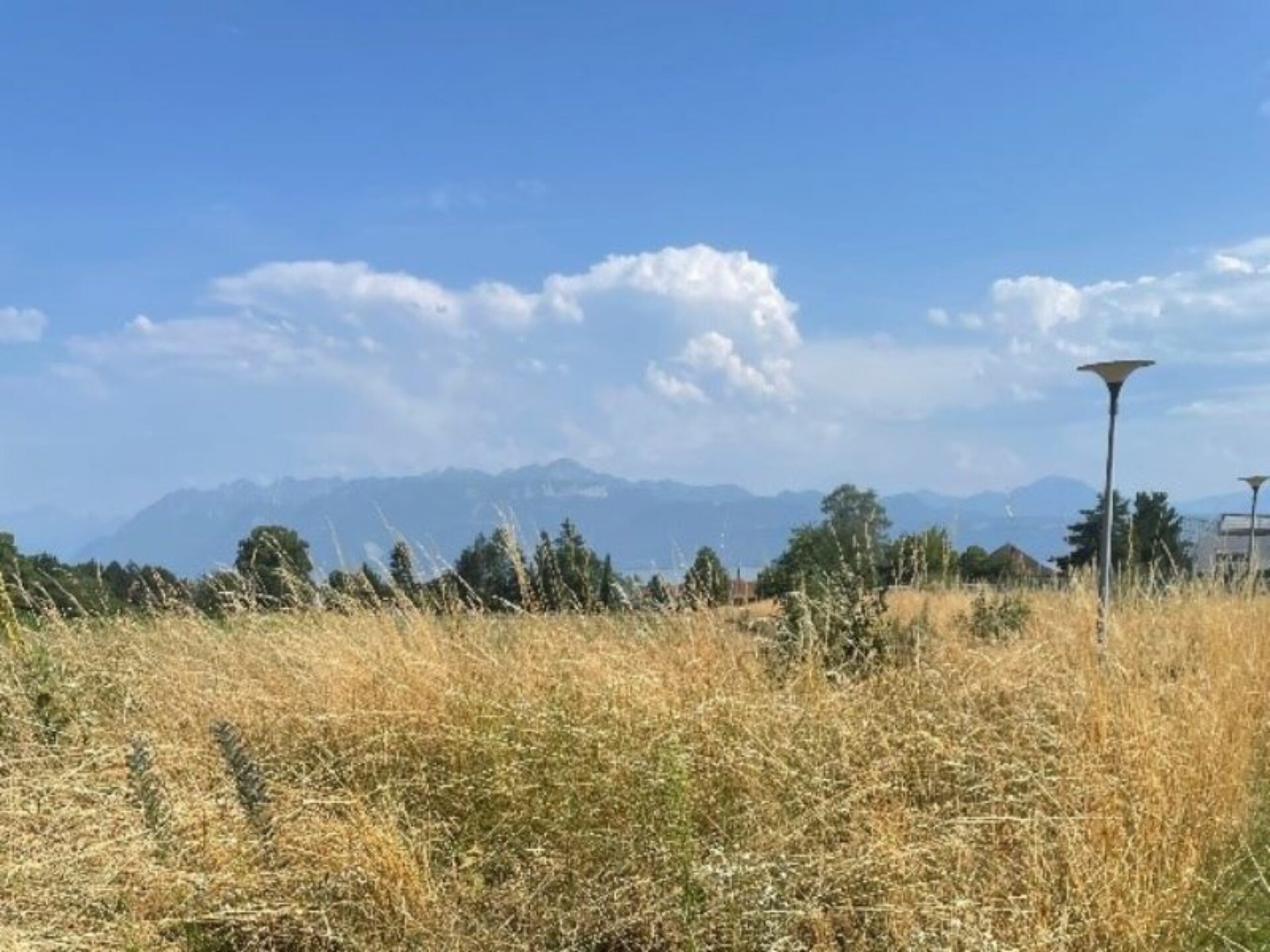McPin Research Director Vanessa shares her take-aways from the early intervention in mental health network event in Switzerland this month.
Vanessa Pinfold
I was in Lausanne in Switzerland last week as the guest of the IEPA network, which started in 2010 with a focus on early intervention in psychosis.
In 2023 IEPA is far broader, with talks on disordered eating, depression, anxiety and, importantly, cultural adaptions in the way we work including beyond diagnosis.
It was a huge privilege to be invited to attend, sharing the work of our team on lived experience involvement in mental health research and launching the first of our resources written to celebrate 10 years at McPin.
IEPA14 – early interventions and networking in Lausanne
The schedule had been carefully created by Professors Lucia Valmaggia from KCL and Philippe Conus from the University of Lausanne, who were also our hosts.
Over 800 people from across the globe registered to attend – I met people from India, Zimbabwe, France, New Zealand, USA, Australia, Switzerland, Japan, Canada, Brazil and the UK – all eager to share learning around innovative early intervention mental health care and research.
I do want to thank Lucia and Philippe as it was a privilege to be able to speak about our work – all things public involvement in research – and hear about progress in virtual reality, interventions in low- and middle-income countries, and inequalities in mental healthcare including racism, climate change and mental health and digital platforms and interventions.
I wanted to highlight a few of my take-home messages from the conference. It is hard to digest – there were so many talks across three days – but my focus is on shared learning from lived experience perspectives.
We need research that embraces cultural humility to create tools that respect the knowledge and experiences of indigenous populations.
Changing the way we approach psychosis
The symposium was titled ‘Approaches to equity and decolonisation across diverse cultural settings’. It focused on Māori – Indigenous Peoples of New Zealand – and the Confederated tribes of Warm Springs Oregon USA.
We heard from Alison, a clinical psychologist and member of three Māori tribes, about work to transform early intervention in psychosis services by weaving together Māori and western knowledge in a ‘braided rivers approach’, or by adopting ‘an indigenous psychology approach’.
The key message was that we need alternative conceptualisations and measures of psychosis in order to deliver appropriate support. We need research that embraces cultural humility to create tools that respect the knowledge and experiences of indigenous populations.
We also heard from Alice (Wishlight) and Julia (Cxla), a mum and daughter, about the importance of honouring traditional knowledge to promote healing in health relationships.
Alice explained: “Every word, song, way of life today, we have to cherish as it has the blood of our ancestors. These things are very special to us.”
Alice has worked for over 37 years addressing her own and others’ ‘pain–forgiveness-pain-forgiveness’ journey towards healing. Julia talked about her recovery from addiction and what kind of services are needed. She said: “Accept people where they are at to heal… and quick access is best.”
A central message was to move away from dominant paradigms, work on our distress tolerance together, taking responsibility for Western-dominated actions, and better centre expert voices – in this case, tribal voices.
We need both accountability and learning built upon strong relationships and a commitment to healing. I will never forget meeting these two women and the hug we shared in Lausanne.
Exercise is still a crucial part of his life and his message was that recovery is not an easy process, but it is possible.
Small gestures can make a huge difference
The last talk I attended was a film presented by the film director Susanne Serres. It was raw and powerful, following one woman’s experience of psychosis and the support of her family.
Susanne explained how her own health had been supported through creativity and she wanted, through her film, to emphasise the importance of the small gestures that make recovery possible for many. She certainly did that and more – thank you for sharing your creativity with us.
Non-linear timeline of my recovery; empowering alternatives
On the first day of the conference there was a lived experience panel with three speakers talking about their work and struggles with mental health, alongside their expertise as researchers, peer support worker and artists.
Jean from Canada spoke about his journey managing schizophrenia with the support of his family. He had been a personal trainer before becoming unwell in his 30s.
Exercise is still a crucial part of his life and his message was that recovery is “not an easy process”, but it is possible. He now inspires hope in others, working in an early intervention in psychosis team.
Candela shared how music was critical in her life, but treatment approaches did not embrace her talents.
She shared that at first her own search for scientific explanations was not empowering or helpful, but she started a PhD and bought a piano, learning to play and write songs. This has been transformational and moving, from feeling despair to inspired.
Her tips for empowering alternatives are below and we look forward to hearing about findings from her PhD in the near future.

Invitation not expectation
We heard on the first day about coproduction from teams in the UK and Australia. I asked each speaker for tips on how to prevent coproduction being co-opted into something that was, well, not coproduced!
Zaynab, a member of the young people’s advisory group in Birmingham’s Institute of mental health had some really important advice:
- Create a lived experience strategy that positively promotes a culture of inclusivity, building cohesion in a group. Working from a lived experience perspective requires space for post-traumatic growth.
- A coproduction group needs a co-ordinator and people with a background in youth work are ideal when the focus is young people. It is important to reduce the ‘them’ and ‘us’ mentality between academics and lived experience members of a group; a good coordinator will do that, including making sure there are options – providing invitations rather than creating a sense of obligations that may feel inappropriate.
Andrew from the Orygen team in Australia provided another really useful tip. He advised helping to break down power differentials in coproducing teams by always starting a meeting with a ‘relational check-in’. I think this is a brilliant idea – consistently not as one-off conversations – and aim to propose it to project teams in a study or two myself.
Work with people where they are at
My final reflection is something that was said on a panel about support groups in India where people with psychosis and family members attend – and the importance of flexibility, compassionate care and kindness, recognising traditional beliefs and resource constraint.
The approach that mattered most, they suggested, is working with an individual where they are at.
This links to a lot of research we at McPin have been involved in recently included collaborative care models and virtual reality (VR).
Our Deputy Director of Public Involvement Thomas Kabir also presented our work on gameChange, which involved many people with lived experience as advisors to shape a VR intervention. You can read about its findings here.
We want to work with people on a research involvement journey, ensuring our work is diverse and impactful. We are keen to learn from other so please do get in touch if you have tips to share, and sign up to our newsletter to find out more about our work.
Vanessa Pinfold is Research Director and co-founder at McPin.
